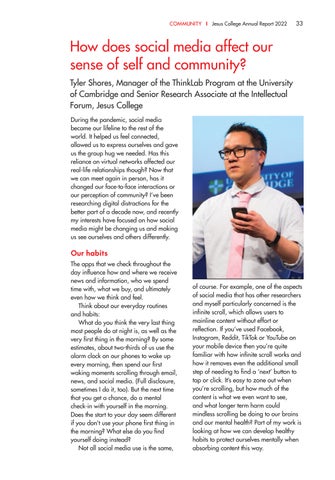COMMUNITY I Jesus College Annual Report 2022
33
How does social media affect our sense of self and community? Tyler Shores, Manager of the ThinkLab Program at the University of Cambridge and Senior Research Associate at the Intellectual Forum, Jesus College During the pandemic, social media became our lifeline to the rest of the world. It helped us feel connected, allowed us to express ourselves and gave us the group hug we needed. Has this reliance on virtual networks affected our real-life relationships though? Now that we can meet again in person, has it changed our face-to-face interactions or our perception of community? I’ve been researching digital distractions for the better part of a decade now, and recently my interests have focused on how social media might be changing us and making us see ourselves and others differently.
Our habits The apps that we check throughout the day influence how and where we receive news and information, who we spend time with, what we buy, and ultimately even how we think and feel. Think about our everyday routines and habits: What do you think the very last thing most people do at night is, as well as the very first thing in the morning? By some estimates, about two-thirds of us use the alarm clock on our phones to wake up every morning, then spend our first waking moments scrolling through email, news, and social media. (Full disclosure, sometimes I do it, too). But the next time that you get a chance, do a mental check-in with yourself in the morning. Does the start to your day seem different if you don’t use your phone first thing in the morning? What else do you find yourself doing instead? Not all social media use is the same,
of course. For example, one of the aspects of social media that has other researchers and myself particularly concerned is the infinite scroll, which allows users to mainline content without effort or reflection. If you’ve used Facebook, Instagram, Reddit, TikTok or YouTube on your mobile device then you’re quite familiar with how infinite scroll works and how it removes even the additional small step of needing to find a ‘next’ button to tap or click. It’s easy to zone out when you’re scrolling, but how much of the content is what we even want to see, and what longer term harm could mindless scrolling be doing to our brains and our mental health? Part of my work is looking at how we can develop healthy habits to protect ourselves mentally when absorbing content this way.































